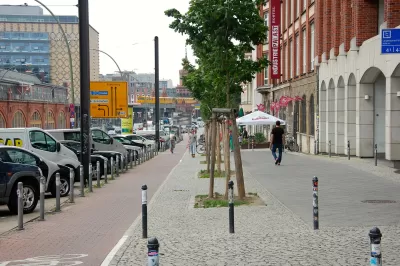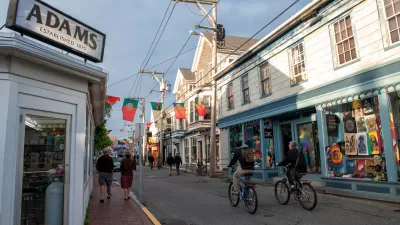Better safety and multimodal ease are not the only benefits offered by complete streets. According to this report, on the average they pay for themselves and then some.

Since the town of Normal in Illinois adopted a complete streets approach, business and walkability have skyrocketed. Laura Searfoss writes, "Today, more than 40 percent of all trips in Uptown Normal are by foot or bicycle. Since these improvements, it experienced a boost in retail sales (46 percent) and attracted more than $160 million in private investment." The Complete Streets project cost Normal $47 million.
While the safety and livability benefits of complete streets are intangible, redesign for multiple modes can also make sound business sense. A recent report from Smart Growth America makes the economic case for investment in complete streets. Arguments include:
- Safer streets protect human life, but they also save a city money: "Each collision that a safer street helps to avoid represents avoided costs from emergency room visits, hospital charges, rehabilitation, and doctor visits, as well as the cost of property damage."
- Complete streets, on average, don't strain public coffers: "The average cost of a project was just $2.1 million—far less than the $9 million average cost of projects in state transportation improvement plans."
- Arteries with complete streets engineering attract greater private investment, boosting tax revenue and land value.
FULL STORY: Complete Streets Are a Bargain

Maui's Vacation Rental Debate Turns Ugly
Verbal attacks, misinformation campaigns and fistfights plague a high-stakes debate to convert thousands of vacation rentals into long-term housing.

Planetizen Federal Action Tracker
A weekly monitor of how Trump’s orders and actions are impacting planners and planning in America.

Chicago’s Ghost Rails
Just beneath the surface of the modern city lie the remnants of its expansive early 20th-century streetcar system.

Bend, Oregon Zoning Reforms Prioritize Small-Scale Housing
The city altered its zoning code to allow multi-family housing and eliminated parking mandates citywide.

Amtrak Cutting Jobs, Funding to High-Speed Rail
The agency plans to cut 10 percent of its workforce and has confirmed it will not fund new high-speed rail projects.

LA Denies Basic Services to Unhoused Residents
The city has repeatedly failed to respond to requests for trash pickup at encampment sites, and eliminated a program that provided mobile showers and toilets.
Urban Design for Planners 1: Software Tools
This six-course series explores essential urban design concepts using open source software and equips planners with the tools they need to participate fully in the urban design process.
Planning for Universal Design
Learn the tools for implementing Universal Design in planning regulations.
planning NEXT
Appalachian Highlands Housing Partners
Mpact (founded as Rail~Volution)
City of Camden Redevelopment Agency
City of Astoria
City of Portland
City of Laramie





























